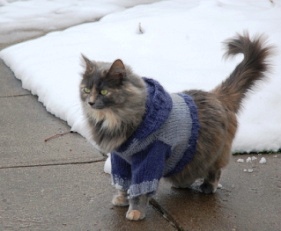Dogs
 By Langley Cornwell
By Langley Cornwell
It is cold today, bundle-up-tight cold. I just got back from the grocery store and have not completely thawed out. While I was in the grocery parking lot, the only available space was beside a car with a small dog locked inside. As I stood between the cars planning my next move, an elderly woman approached. I started a friendly chat with her and subtly mentioned the dangers of leaving a small dog alone in a car during the cold winter months. I gently explained how a car can function much like a refrigerator, trapping the cold air inside and harmfully lowering the dog’s body temperature. She seemed grateful for the conversation, and went on to tell me how much she loved her ‘Sassy’ and would do anything for that dog.
Those circumstances compel me to write about a topic that has been well-covered but may serve as an important refresher this time of year. Here are a few important tips to help protect your cats and dogs during the winter months:
Be careful with chemicals. Many people use chemical products to melt the sleet, snow and ice from their sidewalks and driveways. If you live in an area where these types of products are needed, look for pet safe options. Of course, the salt or chemicals your neighbor and the local highway department uses may not be safe for pets. These potentially toxic products can cause a host of problems including chemical burns to your dog or cat’s pads, tongue and throat. Additionally, salt, antifreeze and other chemicals can cause a variety of illnesses when ingested.
If possible, train your pet to wear booties. If protective footwear is not an option, there are paw wax products available to help keep your dog safe on winter outings. Review these winter paw-care tips and always clean your pet’s chest, stomach, legs and feet with warm water when he comes in out of the ice, sleet or snow.
Remember the identification. If your cat is an indoor/outdoor cat, consider lessening his outdoor time, and never let your dog off-leash in the snow or ice. Animals may lose their scent in inclement weather and can easily get lost. In fact, according to the ASPCA, more dogs are lost during the winter months than during any other season of the year. When any of your pets go outside in the winter, on or off leash, make sure they always wear prominent ID tags.
Revamp your pet’s bathroom procedures. Puppies and kittens have a more difficult time tolerating cold weather than adult dogs and cats. If you’ve recently rescued a young furry companion, be extra careful during the winter months. It’s a good idea to keep a kitten inside the entire season. Make sure the litter box is clean and easily accessible. Regarding a puppy, it may be difficult to housebreak him during the winter. If your puppy is a toy or miniature breed, short-haired or simply appears to be sensitive to the weather, you may choose to paper-train him inside. On the other end of the spectrum, if your dog is sensitive to the cold due to illness, older age or breed type, keep him inside a majority of the winter. Set a consistent schedule and take him outdoors only when it’s time to eliminate.
Provide the basics. Make sure your companion animal has a warm place to sleep, away from drafty floors and windows. Place a comfortable dog or cat bed in a warm spot and add a blanket and/or pillow. Active dogs may need an increased supply of nutritious pet food, like premium quality CANIDAE, during the colder months. And keep a steady source of fresh, unfrozen water available for pets all winter.

Additional considerations this winter:
• Bang on the hood of your car before starting the engine in case a cat was seeking warmth and shelter underneath.
• Consider investing in some winter clothes and accessories to keep your pets safe and warm.
• Be on the lookout for signs of hypothermia and act accordingly.
• Don’t leave your dog locked in a cold car.
• Show kindness to strays and outside animals.
What did I miss? Please share your winter safety tips so we can learn from each other.
Read more articles by Langley Cornwell
- Why Some Dogs Need Winter Coats To Stay Warm
By Linda Cole My first dog, Jack, was an American Eskimo. He had a thick undercoat that kept him toasty warm through even the coldest winter blast. Most of my dogs have been large with warm coats, and I never thought much about winter coats for dogs...
- Tips On Choosing Winter Accessories For Your Dog
By Tamara L. Waters You might be thinking it's a simple thing to choose which winter accessories your dog needs to be warm and cozy in cold weather, but there are a few things to consider. Winter Coats and Boots There are winter accessories that...
- Fall Pet Care Tips For Dog Owners
By Suzanne Alicie As cooler weather moves in, there are certain things that responsible pet owners should take care of before winter hits. Autumn is the ideal time to do several basic pet maintenance tasks to ensure that your dog has a warm and comfortable...
- Caring For Outside Pets In Cold Weather
By Linda Cole Not every pet has the luxury of sleeping inside in a special pet bed or snuggling under a warm blanket beside their human on cold winter nights. Some pets are not able to share their owner's home for a variety of reasons. Even though...
- Winter Care For Pets
By Linda Cole October is quickly coming to a close, and for those in the northern part of the country, chilly winds are stripping red, orange and yellow leaves from trees and leaving only memories of a warm summer sun. The first freeze withers garden...
Dogs
Winter Safety Tips for Responsible Pet Owners

It is cold today, bundle-up-tight cold. I just got back from the grocery store and have not completely thawed out. While I was in the grocery parking lot, the only available space was beside a car with a small dog locked inside. As I stood between the cars planning my next move, an elderly woman approached. I started a friendly chat with her and subtly mentioned the dangers of leaving a small dog alone in a car during the cold winter months. I gently explained how a car can function much like a refrigerator, trapping the cold air inside and harmfully lowering the dog’s body temperature. She seemed grateful for the conversation, and went on to tell me how much she loved her ‘Sassy’ and would do anything for that dog.
Those circumstances compel me to write about a topic that has been well-covered but may serve as an important refresher this time of year. Here are a few important tips to help protect your cats and dogs during the winter months:
Be careful with chemicals. Many people use chemical products to melt the sleet, snow and ice from their sidewalks and driveways. If you live in an area where these types of products are needed, look for pet safe options. Of course, the salt or chemicals your neighbor and the local highway department uses may not be safe for pets. These potentially toxic products can cause a host of problems including chemical burns to your dog or cat’s pads, tongue and throat. Additionally, salt, antifreeze and other chemicals can cause a variety of illnesses when ingested.
If possible, train your pet to wear booties. If protective footwear is not an option, there are paw wax products available to help keep your dog safe on winter outings. Review these winter paw-care tips and always clean your pet’s chest, stomach, legs and feet with warm water when he comes in out of the ice, sleet or snow.
Remember the identification. If your cat is an indoor/outdoor cat, consider lessening his outdoor time, and never let your dog off-leash in the snow or ice. Animals may lose their scent in inclement weather and can easily get lost. In fact, according to the ASPCA, more dogs are lost during the winter months than during any other season of the year. When any of your pets go outside in the winter, on or off leash, make sure they always wear prominent ID tags.
Revamp your pet’s bathroom procedures. Puppies and kittens have a more difficult time tolerating cold weather than adult dogs and cats. If you’ve recently rescued a young furry companion, be extra careful during the winter months. It’s a good idea to keep a kitten inside the entire season. Make sure the litter box is clean and easily accessible. Regarding a puppy, it may be difficult to housebreak him during the winter. If your puppy is a toy or miniature breed, short-haired or simply appears to be sensitive to the weather, you may choose to paper-train him inside. On the other end of the spectrum, if your dog is sensitive to the cold due to illness, older age or breed type, keep him inside a majority of the winter. Set a consistent schedule and take him outdoors only when it’s time to eliminate.
Provide the basics. Make sure your companion animal has a warm place to sleep, away from drafty floors and windows. Place a comfortable dog or cat bed in a warm spot and add a blanket and/or pillow. Active dogs may need an increased supply of nutritious pet food, like premium quality CANIDAE, during the colder months. And keep a steady source of fresh, unfrozen water available for pets all winter.

Additional considerations this winter:
• Bang on the hood of your car before starting the engine in case a cat was seeking warmth and shelter underneath.
• Consider investing in some winter clothes and accessories to keep your pets safe and warm.
• Be on the lookout for signs of hypothermia and act accordingly.
• Don’t leave your dog locked in a cold car.
• Show kindness to strays and outside animals.
What did I miss? Please share your winter safety tips so we can learn from each other.
Read more articles by Langley Cornwell
- Why Some Dogs Need Winter Coats To Stay Warm
By Linda Cole My first dog, Jack, was an American Eskimo. He had a thick undercoat that kept him toasty warm through even the coldest winter blast. Most of my dogs have been large with warm coats, and I never thought much about winter coats for dogs...
- Tips On Choosing Winter Accessories For Your Dog
By Tamara L. Waters You might be thinking it's a simple thing to choose which winter accessories your dog needs to be warm and cozy in cold weather, but there are a few things to consider. Winter Coats and Boots There are winter accessories that...
- Fall Pet Care Tips For Dog Owners
By Suzanne Alicie As cooler weather moves in, there are certain things that responsible pet owners should take care of before winter hits. Autumn is the ideal time to do several basic pet maintenance tasks to ensure that your dog has a warm and comfortable...
- Caring For Outside Pets In Cold Weather
By Linda Cole Not every pet has the luxury of sleeping inside in a special pet bed or snuggling under a warm blanket beside their human on cold winter nights. Some pets are not able to share their owner's home for a variety of reasons. Even though...
- Winter Care For Pets
By Linda Cole October is quickly coming to a close, and for those in the northern part of the country, chilly winds are stripping red, orange and yellow leaves from trees and leaving only memories of a warm summer sun. The first freeze withers garden...
